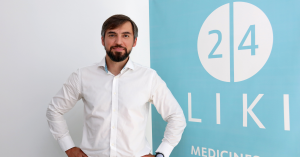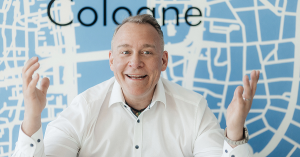The fact that nearly 80% of the medical issues stem from the lack of preventive healthcare is not a startling statistic, nor is the fact that badly described treatment and medical guidance leads to poor medical records management. As users of medical services, we would also expect that the family doctor-patient ratio is quite unbalanced – one general doctor takes care of an average of 1.75 people. Such healthcare issues are so common that we have normalized them, but one young Romanian digital health startup founded by Eduard Andrei develops solutions that address these long-lasting problems. His online medical platform Recomedica provides users with instant prevention and monitoring recommendations made by certified primary doctors so that patients have access to a fast and reliable channel of communication with health professionals.
The need for telemedicine solutions has accelerated after the pandemic, and people are starting to realize the importance of bringing digital transformation into healthcare. That is why Recomedica’s recent campaign on Seedblink attracted such wide interest from crowdfunding equity investors and their round ultimately finished with a €350K investment from 45 investors.
The Recursive team talked with the CEO and founder of Recomedica – Eduard Andrei, to learn more about the story behind the startup and more about the current digital healthcare trends.
How it all started?
Back in 2000, his mother was diagnosed with a serious medical condition so when he turned 22 he started taking care of her full time, which made him learn a lot about medicine – mainly from Google or by asking doctors. Eduard recognized that there was a very big problem of miscommunication between the medical entities and namely between the patient and the other doctors and between the doctors and the medical services. The fact that they were not synced together led to ineffective communication and hindered the treatment of the patients. It was then when Eduard came up with the solution to gather a dozen of doctors and connect them in a WhatsApp group so that they can freely discuss medical cases with each other and come up with a common medical answer. Eduard realized the potential impact that such a solution can have on society and gathered a team that started working on the development of 4 small platforms for different medical perspectives.
The first platform focused on gathering only specialized doctors who tackle serious medical conditions, while the second one enabled cross-communication between general doctors who provide preventive medical services. The third platform helped patients keep track of their results from medical services blood tests and discuss these results with doctors, and the fourth platform specialized in health monitoring that takes place after the patients are already diagnosed with a medical condition. In the end, these small platforms were all transformed into a single platform, Recomedica, that combined all of the knowledge that the team has gathered up to that point.
From bootstrapping to crowdfunding and the way ahead
With a background in marketing, Eduard shares that in the beginning, he financed the project by using all of the profit, which his publicity agency generated. Therefore, up until November 2020 when the team received a €25K investment, the startup was completely bootstrapped. The participation of doctors was voluntary and the platform did not charge users because the product was in its testing stages. In January 2021, however, the team of Recomedica introduced a subscription version, which according to Eduard means that the business model of the startup has reached the sweet spot of balancing between creating wealth and fulfilling a good purpose so that the startup can both satisfy their customers and their investors, and that is why the team decided that it is time to look for more investment opportunities. He shares that in less than three weeks after the launch of the subscription services, more than 2600 users subscribed to the platform and the startup is beginning to generate revenue.
Eduard explains that for the team of Recomedica it made more sense to choose Seedblink instead of VCs because Recomedica is people-centric, which makes it attractive to individual crowdfunding investors. Eduard shares that founders of startups in such initial stages as Recomedica need to have the full decision-making power to test, change and find what is the best thing for their users. He notes that in the next stages when their team improves further the solution and finds the perfect market fit, they will be ready to work with VCs.
In terms of the future plans of the startup, Eduard shares that right now Recomedica’s team is focused on improving the platform, developing the Recomedica Mobile App, and establishing their presence in the Romanian market. In one year, the startup plans to boost their international expansion efforts by entering neighboring markets from the SEE region. Besides launching the app, the other short-term goals of Recomedica for 2021 are to get around 7000 medical professionals on board and increase the number of its partners/services to 250, as well as to expand its marketing and software development departments.
Automation in healthcare – trends and challenges
Eduard highlights that the pandemic has contributed to the creation of a new standard for the infrastructure of digital health – all governments in the world have started to improve and digitize their healthcare infrastructures, which accelerated the growth of the digital health industry. The predictions of Eduard Andrei are that in a few years technology will be able to give patients a 99% accurate medical opinion while in 10 – 15 years people will have solid reasons to trust automation enough to use it to perform operations and take charge of human health, but he also believes that the human element cannot disappear.







